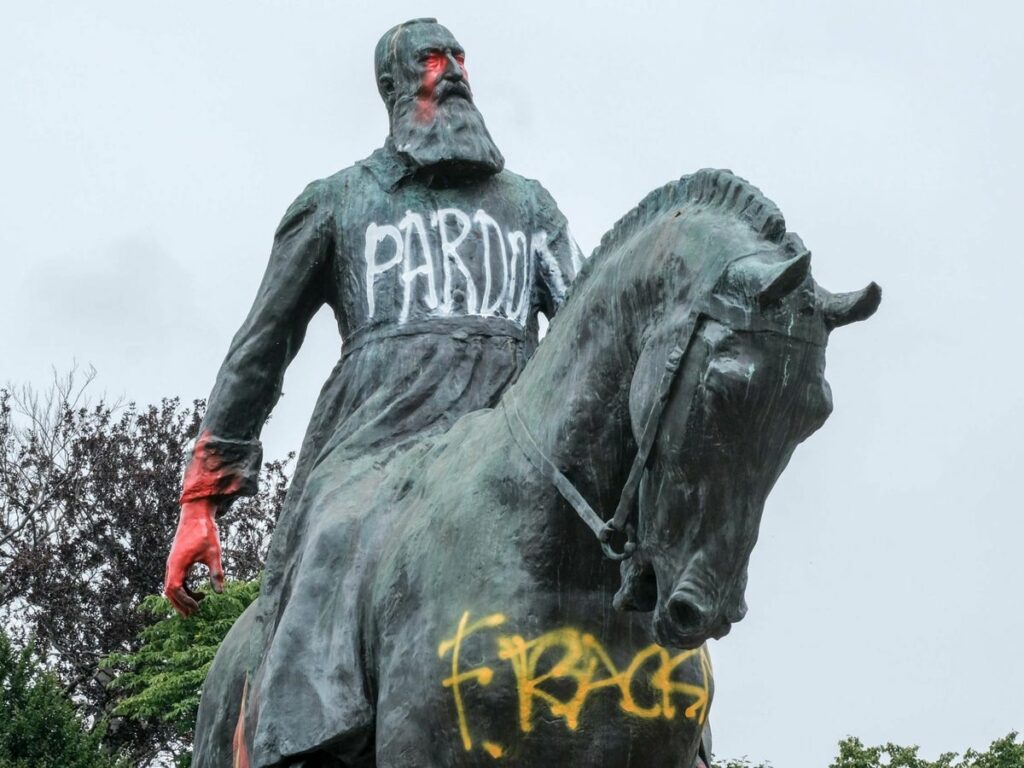I have never seen someone get lost when destroyed. By becoming worthless, a person can only be erased. If Leopold's ghost is still alive, hanging over Belgium, that is not because of the fact that his statues and palaces are still remaining in their places. It is because what he symbolizes is still living in the mindset of people.
With or without his statues, Leopold II will remain who he is. Of course, his statues are made to show his power. But today, despite the crimes he committed, his statues are creating an antithesis to his "glorified" image. Therefore, his statues do not represent his heroism in today's world. In contrast, they represent his unimaginable cruelty, Belgium's colonization in Congo.
If we only demolish statues and vandalize palaces, then we would only serve the needs of those statues and palaces by keeping them relevant. But if we get into the depth of colonization and increase our research on the history of colonialism to confront Europe with its bloody past, then we can naturally enable Leopold's already shaken image, become more worthless.
Otherwise, we will first remove the statues, then we will vandalize the palaces. And that won't be enough, we will search for other things that can be destroyed. But I want to ask, which destruction attempt have reached success yet?
In short, there is no end to this. Of course, we can't remove the fingerprints of the past (also we shouldn't). Still, we should always question the positive/negative influences of the figures from the past. In Leopold II's case, it is a cruel colonization and a massive massacre.
More so, we should do this questioning for the next generation, than for ourselves. We should show them that those splendid palaces, kingdoms are not constructed by an admired heroism, instead they were built by horrifying oppression and cruelty.
The things that are still harming us in our social life are not the things that happened in the past. It is the things that still exist with their effects that occurred in the past. So if we are still actively discussing immigrants' rights and people living under the starvation line, then this means we have a system that needs to be changed.
If we can make our world more equitable for everyone, neither Leopold' nor any other tyrants, colonizers representation can continue haunt us. Today, we are not precisely disturbed by Leopold's statues standing on the streets of Belgium, we are disturbed mainly by the ongoing inequality, lack of basic human life resources in many continents around the globe, like Congo.
We can destroy all the people, objects that represent colonialism, tyranny as we want. But if we keep seeing one culture, continent superior to another and perceive those countries as ‘less developed, cheap worker market’ and consume their resources; then inequality and exploitation will remain predominant, and Leopold's image would likely stay fresh.
Leopold's breath is not continuing in his statues or his palaces. Instead, they are continuing in the ideas of people, countries politics. Undoubtedly, the origin of this problem lies in the history of colonialism. For that reason, we have to look at Leopold's infamous legacy repeatedly. And in museums' and school curriculums, we should inform people about perhaps the darkest period in Belgium's history.
But addition to that, we should also not forget our main task, which is to provide every single citizen in the world a fair life standard and equal rights. So rather than banishing Leopold, let's put the spotlight on him more. Only through that, people from Belgium and around the world can become more aware of how the land they walk on and their resources come from a brutal, bloody past. So I say, do not destroy; let's display it more."
Of course, Belgium's colonial past can't be justified by a simple apology. Confronting it’s history is not equal to making an apology. The US apologized for the Vietnam War, but was that a real confrontation? Does that prevent them from making a similar mistake in the invasion of Iraq?
As Mark Twain said, "History never repeats itself, but it does often rhyme." And without a serious confrontation with the past, crimes committed by Belgium against Congo can happen again and again. Not as a repetition but by a similar pattern.
Yes, our wounds existed before us, so we are not directly responsible for our ancestors.
But what about the people our ancestors hurt? Did we really give them a chance to heal?
Aren't we still reaping the fruits from our colonial past?
Today, despite the country's rich natural sources, the Republic Of The Congo is the second poorest country globally. At the same time, Belgium ranks as the sixth wealthiest country. And also, according to the Credit Suisse Global Wealth Report, the world's richest 1 percent, those with more than $1 million own 45.8 percent of the world's wealth.
In my opinion, this is the point where Leopold blossoms. Because Leopold II lives in places where injustice, racism, oppression happen. It is not the palaces that lost their "glorious past", where Leopold II resurrects, it is the places where one man's fortune is equal to one country's real income.
So, Leopold II is a global issue, not only a problem of Belgium. And ‘Leopolds’ are not only still living in Belgium, but they also continue to live everywhere else around the world. But not in a statue mold, in human mold.
I favour creating rather than destroying. Instead of discussing what we should remove, let's discuss the things we can create to make this beautiful city (Brussels) more beautiful. And at the same time, let's confront our past while discussing present injustices.


